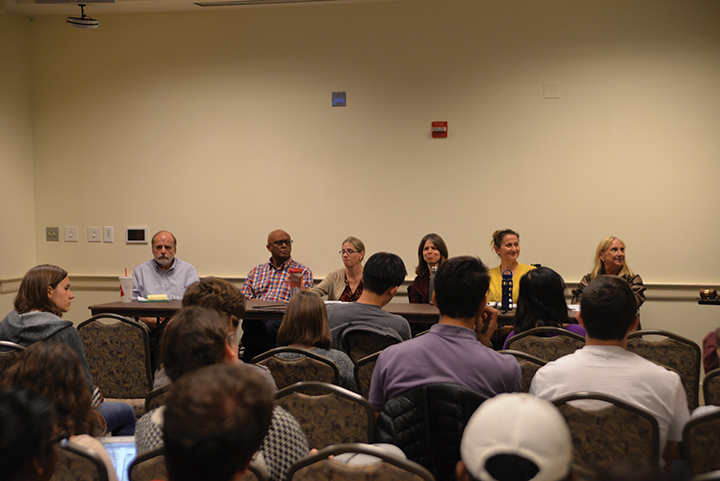This year’s new Anytime Dining plan and upcoming transportation changes were hot topics at the RHA town hall on Tuesday night.
About 50 students attended the event, which the Residence Hall Association holds each semester to allow students to talk to and hear updates from officials from various university departments, such as the Department of Resident Life, the Department of Transportation Services and Dining Services.
“This public forum is instrumental in keeping that connection and widening the communication channel between the departments and the student body,” said Sasha Galbreath, RHA vice president and a senior government and politics major.
Dining Services Director Colleen Wright-Riva called the new Anytime Dining plan a success overall.
“There are some things that I think some returning students really loved about the old plan, but by and large our feedback from students has been that all of the additional attributes that we’ve added to the plan are the ‘wow factor’ that we were going for,” she said, adding that Dining Services has seen 30 percent more participation in their dining halls as of this semester.
Wright-Riva noted that the Anytime Dining plan has reduced waste, and because dining hall staff is able to sort food waste, it’s being done so appropriately.
“This change to anytime dining does stop 6.3 million pieces of carry out from going into any number of waste streams every single year,” she said.
When asked about the dining halls’ hours on weekends — South Campus and North Campus Dining Halls both close at 10 p.m. on Friday and Saturday — Wright-Riva said finding staff for these hours was a particularly large barrier for extending weekend hours but added that this university’s dining hall hours are more expansive than those of its Big Ten peers.
Dining Services is also working to increase consistency in labeling the foods served, Wright-Riva said, and to bring back dining hall favorites such as mozzarella sticks as “pop-up specials.”
New eateries are expected in the H.J. Patterson and Edward St. John buildings, she said, and the Applause cafe in the Clarice Smith Performing Arts Center is set to undergo renovations beginning during winter break.
On the topic of transportation, Department of Transportation Services Director David Allen called this year “the most consequential” time period in recent memory for the University of Maryland.
With seven campus development projects eliminating about 2,700 parking spots by fall 2018, according to DOTS data, the department is considering ways to mitigate the possibility that freshmen and sophomores may no longer be able to park their cars on the campus.
DOTS is currently in negotiations with Zipcar to provide an additional 20 to 40 rental cars for student use, Allen said. He added that the department is also considering subsidizing freshmen and sophomores’ registration fees for this service, as well as the mBike service.
While Campus Drive has been closed to westbound traffic since the first day of classes, Allen said it will reopen in the next month or two, at least until the construction of the Purple Line — a 16.2 mile light-rail transit system set to run through College Park — closes it once more.



